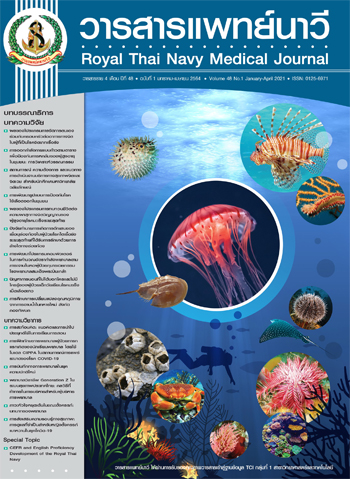Cardiac Arrest during Pregnancy: The Role of Nurses
Main Article Content
Abstract
Cardiac arrest during pregnancy is an obstetric emergency that affects the lives of both the pregnant woman and the fetus. The immediate management is therefore necessary to prepare for emergency situation. The emergency preparation should involve multidisciplinary team, equipment, and nurse competencies. The readiness of nurses include both knowledge and practical skills to effectively care for pregnant women with cardiac arrest from initial assessment of pregnant women who probably have cardiac arrest risk factors then, during cardiac arrest, and post-cardiac arrest for rehabilitation. This article aims at presenting cardiac arrest during pregnancy, potential etiology of maternal cardiac arrest, cardio pulmonary resuscitation in pregnancy and nurses role.
Article Details

This work is licensed under a Creative Commons Attribution-NonCommercial-NoDerivatives 4.0 International License.
References
2. Farinelli CK, Hameed AB. Cardiopulmonary resuscitation in pregnancy. Cardiol Clin 2012;30(3):453-61.
3. Mhyre JM, Tsen LC, Einav S, Kuklina EV, Leffert LR, Bateman BT. Cardiac arrest during hospitalization for delivery in the United States, 1998-2011. Anesthesiology 2014;120(4): 810-8.
4. Soskin PN, Yu J. Resuscitation of the pregnant patient. Emerg Med Clin N Am 2019;37(2):351-63.
5. American Heart Association. Highlights of the 2020 American Heart Association guideline for CPR and ECC. [Internet]. [cited 2020 December 27]. Available from: https://cpr.heart.org/
en/resuscitation-science/cpr-and-ecc-guidelines.
6. Kikuchi J, Deering S. Cardiac arrest in pregnancy. Seminars in Perinatology 2018;42(1):33-8.
7. Zelpo CM. Cardiopulmonary arrest in pregnancy. [Internet]. [cited 2020 October 10]. Available from: http://enjoypregnancyclub.com/wp-content/uploads/2018/05/Cardiopulmonary%
20arrest%20in%20pregnancy.pdf
8. Bekett VA, Knight M, Sharpe P. The CAPS study: incidence, management and outcomes of cardiac arrest in pregnancy in the UK: a prospective, descriptive study. BJOG 2017;124(9):1374-81.
9. Nivatpumin P. Review article: cardiopulmonary resuscitation in pregnancy cardiac arrest and perimorterm cesarean delivery. Thai Journal of Anesthesiology 2017;43(3):257-70.
10. Vanden Hoek L, Morrison LJ, Shuster M, Donnino M, Sinz E, Lavonas EJ, et al. Part 12: Cardiac arrest in special situations 2010 American Heart Association guidelines for cardiopulmonary resuscitation and emergency cardiovascular care. Circulation 2010;122(18):829-61.
11. Jeejeebhoy FM, Zelop CM, Lipman S, Carvalho B, Joglar J, Mhyre JM, et al. Cardiac arrest in pregnancy: a scientific statement from the American Heart Association. Circulation, 2015;132(18):1747-73.
12. Jeejeebhoy FM, Morrison L. Maternal cardiac arrest: a practical and comprehensive review. Emerg Med Int 2013;2013:274814. doi: 10.1155/2013/274814. Epub 2013 Jul 17.
13. Millington S, Magarey J, Dekker GA, Clark RA. Cardiac conditions in pregnancy and the role of midwives: a discussion paper. Nursing Open 2019;6(3):722-32.
14. Prasanathikom B. The Development of advanced cardiac life support training model for intensive care nurses, Udonthani Hospital. Journal of Nursing Science Chulalongkorn University 2017;29(1):130-40. (in Thai).
15. Chanchayanon T, Suwanwong P, Nimmaanrat S. Outcome of in-hospital cardiopulmonary resuscitation and factors affecting the outcome at Songklanagarind Hospital. Songkla Med J 2011;29(1):39-49. (in Thai).
16. Cheng A, Nadkarni VM, Mancini MB, Hunt EB, Zins EH, Merchant RM, et al. Resuscitation education science: educational strategies to improve outcomes from cardiac arrest: a scientific statement from the American Heart Association. Circulation 2018;138(6):e82-122. doi: 10.1161/CIR.0000000000000583.
17. Guetterman TC, Kellenberg JE, Krein SL, Harrod M, Lehrich JL, Iwashyna TJ, et al. Nursing roles for in-hospital cardiac arrest response: higher versus lower performing hospitals. BMJ Quality & Safety 2019;28(11):916-24.
18. Gililland KS. Staff education and training for the maternal cardiac arrest. [Doctoral Dissertation, College of Health Science]. Walden University; 2018.
19 Lee A, Sheen J, Richards S. Intrapartum maternal cardiac arrest: a simulation case for multidisciplinary providers. MedEdPORTAL 2018;14:10768.
20. Leonardsen AL, Svendsen EJ, Heitmann GB, Dhayyat A, Morris A, Sjøborg KD, et al. Development and validation of a questionnaire to assess healthcare personnel competence in cardiac arrest and resuscitation in pregnancy. PLOS ONE, https://doi.org/10.1371/journal.pone.0232984.
21. Mohamed AI, Elbana HM, Elhaleim SA. Maternity nurses’ performance regarding cardiopulmonary resuscitation during pregnancy: simulation based intervention. International Journal of Studies in Nursing 2018;3(1):144-56.
22. Gogle J. Using simulation-based learning to prepare for a potential cardiac emergency on the labour unit. Nurs Womens Health Feb-Mar 2017;21(1):20-27. doi: 10.1016/j.nwh.2016.12.009.
23. Jitkueakun Y, Chaisangkaew I, Poolkaew W, Klomkeeree R. Impact of adjusted cardiopulmonary resuscitation process on return of vital signs and spontaneous circulation in cardiac arrest patients in emergency unit. Thai Journal of Nursing Council 2018;33(4):64-74. (in Thai).
24. Sangpanich C. Factors associated with the outcome of out-of-hospital cardiac arrest. Bomarajonani College of Nursing, Uttaradit Journal 2017;10(Suppl August-October):85-96. (in Thai).
25. Nishiyama C, Iwami T, Kawamura T, Kitamura Y, Tanigawa K, Sakai T, et al. Prodromal symptoms of out-of-hospital cardiac arrests: a report from a large-scale population based cohort study. Resuscitation 2013:84(5):558-63.
26. De Maio VJ, Stiell IG, Wells GA, Spaite DW, OPALS Study Group. Cardiac arrest witnessed by emergency medical services personnel: descriptive epidemiology, prodromal symptoms, and predictors of survival. Annals of Emergency Medicine 2000;35(2):138-46.
27. The Royal Thai College of Obstetricians and Gynecologists. Clinical Practice Guideline: intrapartum fetal monitoring (OB-016). [Internet]. [cited 2020 October 10]. Available: http://www.rtcog.or.th/home/wp-content/uploads/2017/04/OB_016.pdf.


